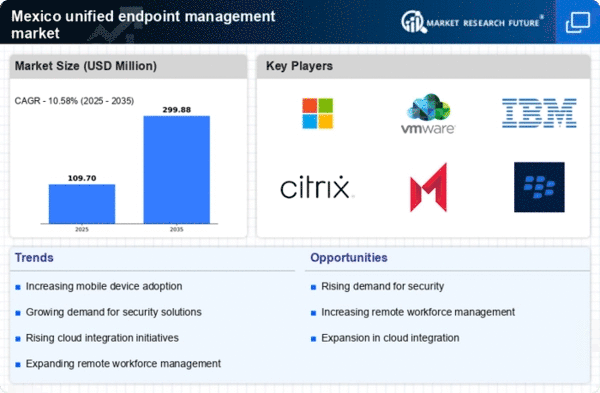Integration of IoT Devices
The integration of Internet of Things (IoT) devices in various sectors is emerging as a key driver for the unified endpoint-management market in Mexico. As organizations adopt IoT technologies to enhance operational efficiency, the complexity of managing these devices increases. Unified endpoint-management solutions are essential for overseeing the diverse range of IoT endpoints, ensuring they are secure and functioning optimally. The market is witnessing a shift towards solutions that can seamlessly integrate IoT devices into existing management frameworks. This trend suggests a growing recognition of the need for comprehensive management tools that can address the unique challenges posed by IoT integration. Consequently, the unified endpoint-management market is expected to experience growth as businesses seek to harness the potential of IoT while maintaining control over their endpoints.
Growing Mobile Device Usage
The proliferation of mobile devices in Mexico is significantly influencing the unified endpoint-management market. With an estimated 80% of the population owning a smartphone, businesses are increasingly challenged to manage a diverse array of mobile endpoints. This trend necessitates the implementation of unified endpoint-management solutions that can effectively oversee and secure these devices. Organizations are recognizing the need for comprehensive management tools that can provide visibility and control over mobile endpoints, ensuring compliance with corporate policies. The unified endpoint-management market is thus poised for growth as companies seek to adapt to the mobile-first landscape, leveraging solutions that enhance productivity while maintaining security across all devices.
Regulatory Compliance Requirements
The unified endpoint-management market in Mexico is also driven by the need for regulatory compliance. As data protection regulations become more stringent, organizations are required to implement robust management solutions that ensure compliance with local laws. The introduction of regulations such as the Federal Law on Protection of Personal Data has heightened the focus on data security and privacy. Companies are increasingly turning to unified endpoint-management solutions to streamline compliance processes and safeguard sensitive information. This trend indicates a growing recognition of the importance of adhering to regulatory standards, which in turn fuels demand for effective endpoint management tools. The unified endpoint-management market is likely to expand as businesses prioritize compliance-driven solutions.
Rising Demand for Remote Work Solutions
The unified endpoint-management market in Mexico is experiencing a notable surge in demand for remote work solutions. As organizations increasingly adopt flexible work arrangements, the need for effective management of diverse endpoints becomes critical. This trend is reflected in the growing number of remote employees, which has reached approximately 30% of the workforce in Mexico. Companies are seeking unified endpoint-management solutions to ensure seamless access to corporate resources while maintaining security protocols. This shift not only enhances productivity but also necessitates robust management tools that can handle various devices and operating systems. The unified endpoint-management market is thus positioned to benefit from this rising demand, as businesses prioritize solutions that facilitate remote work while safeguarding sensitive information.
Increased Focus on Cybersecurity Measures
In the context of the unified endpoint-management market, the heightened focus on cybersecurity measures in Mexico is a significant driver. With cyber threats becoming more sophisticated, organizations are compelled to invest in comprehensive endpoint management solutions that bolster their security posture. Recent studies indicate that cyberattacks in Mexico have increased by over 40% in the past year, prompting businesses to prioritize the protection of their digital assets. Unified endpoint-management solutions offer integrated security features, enabling organizations to monitor, manage, and secure endpoints effectively. This trend underscores the importance of adopting advanced technologies that not only streamline operations but also mitigate risks associated with cyber threats. Consequently, the unified endpoint-management market is likely to see substantial growth as companies seek to enhance their cybersecurity frameworks.
















